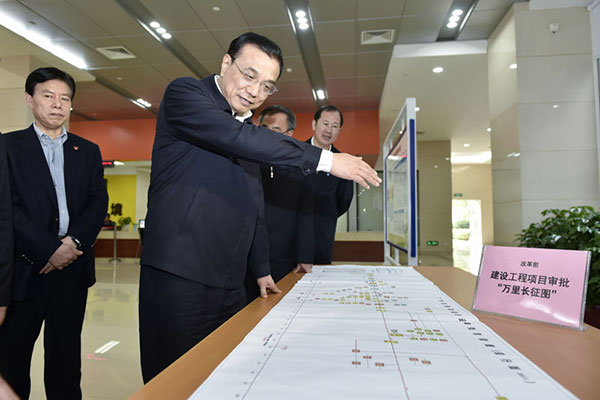
Premier Li Keqiang visits the Nansha area in the Guangdong Free Trade Zone and looks at a chart that explains the 799-day approval process for an investment project in the free trade zone’s Nansha area, Jan 5, 2015.
Four years ago, a long chart of governmental approvals shown in the two sessions of Guangdong city attracted wide attention.
To apply for a project, it took at least 799 days for an enterprise to go through 100 approvals from various departments, obtain 108 seals and pay 36 types of administrative fees.
During his inspection of the Guangdong Free Trade Zone (FTZ) in January 2015, Premier Li Keqiang said, “We should cancel unnecessary approvals on the map, and Guangdong should take the lead in reform”.
Today, through the pilot reform of collective approval, it only takes about 30 days for an investment project to go through all the procedures from proposals to acceptance.
In his first news conference at the national two sessions after taking office, Premier Li said the transformation of government functions should start with administrative approvals.
The reform was effective, but it still took a long time for an enterprise to apply for an investment project.
Too many departments, approvals, and failure to share information among governmental organs contributed to a daunting process.
To tackle the above issues, the Guangdong Free Trade Zone gradually handed administrative approvals for enterprises’ investment and operation to the administrative approval authority.
Meanwhile, administrative approval should be separate from technology evaluation, which will be outsourced to professional institutes.
Under this streamlined process, the authority will only need two days to complete the approval, which also constrains the abuse of power by individual officials.
While striving to delegate power in this regard, the government also changed the mindset and stressed that supervision should outweigh administrative approval.
In the pilot reform of the Guangdong FTZ, the government innovated a redundant approval process with better follow-up supervision, and promoted information and data sharing through collective approvals.
Compared with the situation four years ago, the approval process has been reduced but maintained necessary procedures.
A favorable investment environment also attracts more investment opportunities to the zone.
In 2016, the total number of new domestic investment projects within the zone increased to 6,661, with 30.75 billion yuan in registered capital. And the number of new foreign investment projects surged by 18 to 90.
